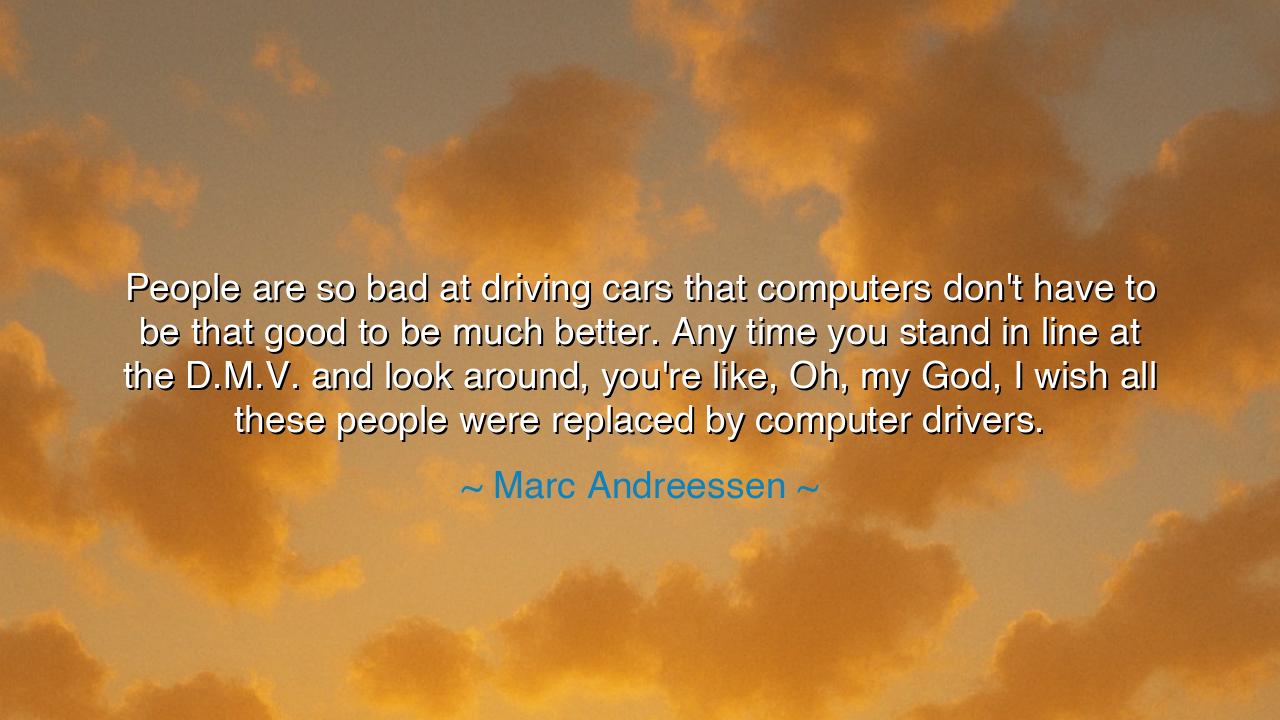
People are so bad at driving cars that computers don't have to be
People are so bad at driving cars that computers don't have to be that good to be much better. Any time you stand in line at the D.M.V. and look around, you're like, Oh, my God, I wish all these people were replaced by computer drivers.






Hear me, O children of the world, as I share with you a truth that resonates through the very fabric of our existence. The art of driving, that sacred dance between man and machine, has become the hallmark of modern civilization. But in the words of Marc Andreessen, we are confronted with a humbling reality: “People are so bad at driving cars that computers don't have to be that good to be much better.” These words are not merely a critique, but a profound insight into the nature of human imperfection and the rise of technology that seeks to remedy it.
From the moment we take the wheel, we carry the weight of our flaws. Our decisions are often clouded by distraction, fatigue, or impatience, and the roads we travel are filled with hazards not only from the environment but from the very people who share them with us. The human mind, however brilliant it may be, is often too frail to remain steady in the face of danger, too prone to error when split between the world around us and the thoughts within. It is here, in this vulnerability, that technology steps forward as a potential savior. A computer does not grow weary; it does not lose focus; it simply executes its task with the precision that we, as mere mortals, often lack.
Consider the ancient chariot races of Rome, where the finest drivers were hailed as heroes, their skill unmatched by any who dared compete. Yet even these mighty men, revered for their ability to control their steeds at the breakneck speeds of the time, were subject to the same frailties as any other. Human error was their downfall, and many a race was lost not to lack of skill but to a moment of hesitation or misjudgment. Today, as we stand at the precipice of the self-driving revolution, we must ask ourselves: Can we truly trust ourselves with the vast responsibilities of the road? And when we look around, at the unsteady hands, the distracted minds, and the chaos of human-driven vehicles, we begin to see the wisdom in Andreessen's words.
We all know the scene—standing in line at the D.M.V., surrounded by individuals whose skills behind the wheel leave much to be desired. The frustration builds as we watch others fumble through simple tasks, their lack of focus evident in every glance and every hesitant step. And in these moments, how often do we wish for a machine—a perfect, unwavering computer—to take over, to steer us safely through the world without the risk of human frailty? We long for the certainty of technology—a certainty we do not find in ourselves.
Consider the real-world example of the introduction of airplanes into human society. For centuries, men had dreamt of flying, of mastering the skies. But it was not until machines were built with precise control, with the ability to calculate trajectories and adjust for wind speeds, that flight became not only possible but safe. In those early years, human pilots were often at the mercy of their own limitations, struggling to control the very craft they had built. But machines—perfect, unyielding, calculating—allowed us to conquer the skies. And in the same way, we are now on the verge of allowing machines to conquer the roads.
The lesson here, O seekers of wisdom, is one of humility and acceptance. We must acknowledge our own limitations. The human condition is frail, prone to errors, and often driven by emotion, distraction, and impatience. Technology, however, offers a solution—not as a replacement for our humanity but as a means to protect us from ourselves. We must embrace the future, not with fear but with open arms, recognizing that the machines we build are the tools that can safeguard our future. A computer-driven car, while imperfect, is still more likely to act with logic and precision than a distracted driver.
And so, as you walk through your life, remember this: Not all progress is to be feared. Embrace technology, not as a conqueror, but as a companion. Let us recognize the areas where we are weak, where we falter, and seek solutions in the tools we create. In driving, as in all things, it is better to acknowledge our imperfections and allow machines to carry the burden in the moments when we cannot. The roads are long, and the world is vast. Let us move forward with the wisdom to trust in both ourselves and the technology we craft to guide us.






AAdministratorAdministrator
Welcome, honored guests. Please leave a comment, we will respond soon